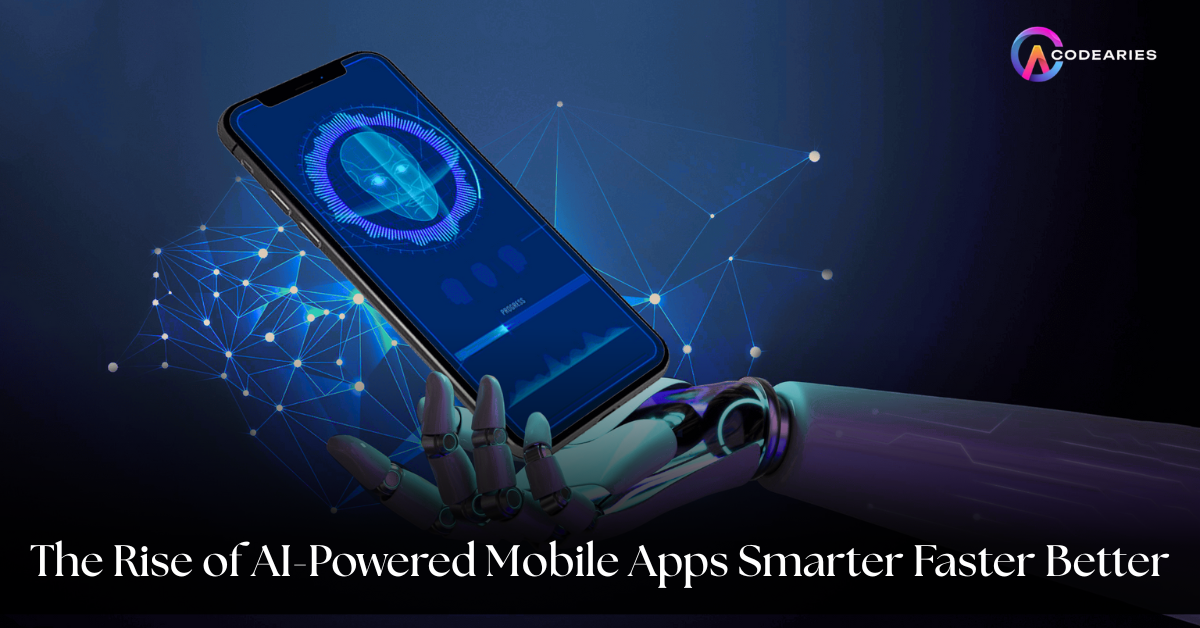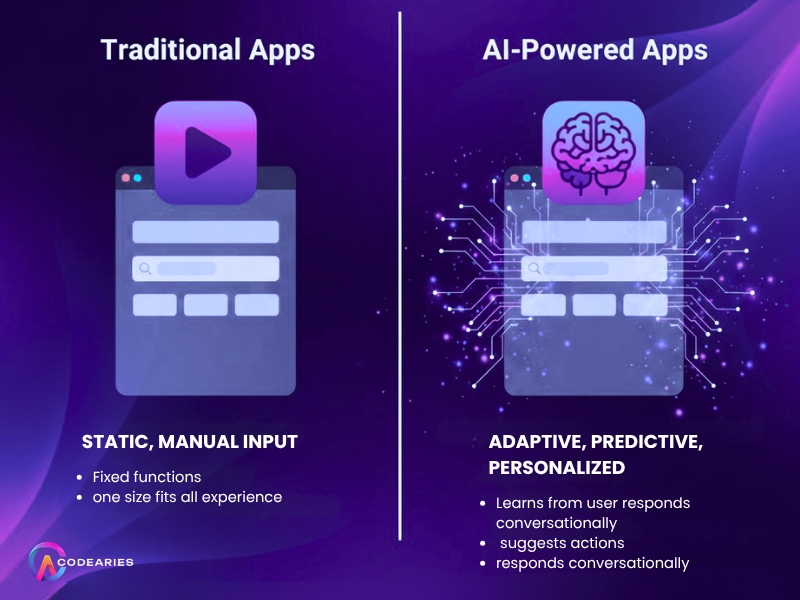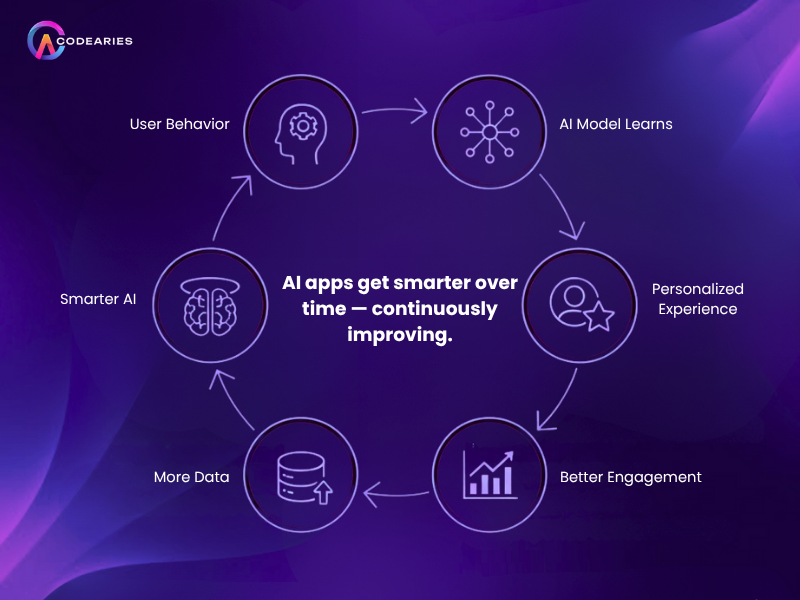
In 2026, mobile apps are undergoing a change that matches the original smartphone revolution. Artificial intelligence is now embedded in almost every major app category, including health, fitness, productivity, entertainment, finance, travel, shopping, and social experiences. AI powered mobile apps no longer just respond to taps or swipes. They anticipate user needs, adjust in real time, and offer new levels of speed, convenience, creativity, and security. This shift is changing how people interact with their devices, extract value from digital services, and rethink what is possible at their fingertips.
Why AI Is Transforming Mobile Apps
AI in mobile apps has progressed beyond background algorithms that optimize speed or recommend content. Today’s leading apps use generative AI, computer vision, voice recognition, and real time personalization to create proactive user experiences. The main reasons for this shift include:
- User expectations for quick, accurate, personalized results with little effort
- The rise of device sensors providing AI with rich contextual data
- AI’s ability to automate routine tasks and streamline workflows
- Cloud computing making complex learning and prediction models run smoothly on mobile devices
The outcome is a new age where apps are smarter, more adaptive, and able to address both business and personal challenges on the go.

Key Capabilities of Next Gen AI Mobile Apps
Personalization at the Core
AI algorithms examine usage patterns, preferences, and even mood to provide targeted recommendations, product suggestions, or media choices right when users need them.
Conversational Interfaces
Natural language processing powers true voice assistants, AI chatbots, and multilingual support, making apps more accessible for users worldwide. Apps in healthcare, fitness, food delivery, and banking are now designed to be conversational.
Predictive and Proactive Features
AI powered apps anticipate what users may want next, from meeting suggestions to travel alerts and shopping reminders.
Intelligent Automation
Tasks such as expense tracking, receipt input, shopping list creation, and document management are managed by AI, reducing user effort and increasing productivity.
Augmented Reality and Computer Vision
Features like visual search and AR try on tools enhance experiences in retail, gaming, and education by providing real world context and object recognition.
On device AI Processing
With advancements in hardware, mobile AI is becoming faster and more private, enabling core functions such as photo enhancement, voice control, and anomaly detection to work without relying on the cloud.
Personal Wellness and Accessibility
AI turns mobile devices into health and therapy assistants, monitoring patterns, suggesting improvements, and offering adaptive interfaces for users of all abilities.
Real World Examples Fueling the Boom
- Health apps use AI to predict heart rate variations, send medication reminders, and identify concerning patterns in wellness data.
- Photo editing apps like Photoshop Camera and FaceApp leverage AI to instantly retouch images, identify objects, and simulate effects previously limited to desktop software.
- Travel platforms forecast price changes, recommend personalized itineraries, and utilize visual search to identify landmarks or translate signs in real time.
- E commerce leaders apply AI for dynamic pricing, voice commerce, personalized promotions, and live shopping events with smart translations.
- Banking apps utilize predictive analytics and AI powered fraud detection to secure transactions, customize alerts, and simplify investment processes.
From Uber’s real time ride predictions and route optimization to Duolingo’s personalized language learning paths and TikTok’s recommendation engine, AI is the driving force that enhances value for users and businesses.

The Competitive Edge AI Brings to Mobile
- Speed: AI speeds up the response time between a need and a solution, customizing responses, recommendations, or automating actions instantly.
- Smarter Engagement: Apps become more engaging as they predict user needs, improving retention and lifetime value.
- Reduced Friction: AI powered apps onboard users quickly, learn their needs, and become more helpful with every interaction.
- Continuous Learning: Models are refined with each user session, meaning the experience improves over time rather than becoming stale.
Mobile developers using AI find they can stand out in an increasingly crowded app market by focusing on features, speed, value, and brand trust.
Challenges and Considerations
- Privacy and Security: Handling sensitive data for personalization and prediction requires transparent consent, strong encryption, and privacy preserving AI.
- Latency and Offline Capabilities: Relying on cloud AI can cause delays in some cases. On device AI can help resolve this, but it may require more powerful hardware or efficient algorithms.
- Ethical AI and Bias: Apps must undergo continuous monitoring to prevent algorithmic bias, especially in health, finance, hiring, and social areas.
- User Adoption: Not all users understand or trust AI, making UI education, clear permissions, and “explainable AI” essential for brand differentiation.
- Integration Complexity: AI models need to coexist with legacy systems, sensors, multiple languages, and accessibility requirements.
These challenges are being tackled as tools improve, regulations are created, and innovation continues to advance.
How Codearies Supercharges AI Mobile App Innovation
At Codearies, we assist brands and startups in harnessing AI to create next generation mobile apps that provide smarter, faster, and better experiences.
- End to End AI App Strategy: Identifying the right use cases for your market, customer base, and value proposition.
- AI Model Selection and Training: Building or integrating top tier natural language processing, computer vision, and predictive analytics models.
- Privacy First Data Engineering: Developing architectures that secure data carefully, support on device AI, and comply with local and global privacy standards.
- User Centric App Design: Intuitive interfaces, personalized journeys, and accessibility built into every app experience.
- On Device and Cloud AI Integration: Optimized for speed, low latency, and offline capabilities.
- Rapid Prototyping and Launch: Research and development to get MVPs and scalable products live quickly.
- Analytics and Continuous Learning: Feedback loops and optimization for ongoing improvement after launch.
With Codearies, your AI powered app will go beyond trends and lead to sustainable business growth and exceptional user engagement.
Frequently Asked Questions
Q1: Can Codearies develop cross-platform AI apps for both Android and iOS?
Yes, we specialize in building native and hybrid apps using AI models that work seamlessly across devices and platforms.
Q2: How does Codearies handle data privacy in AI powered mobile apps?
We design data flow architectures with encryption, minimal retention, and clear opt in controls to protect sensitive user information.
Q3: Can you integrate custom AI models and existing third party solutions?
Absolutely. We can train and deploy proprietary AI, as well as integrate APIs from leading AI providers based on strategic fit.
Q4: How long does it take to deliver an AI powered mobile app?
Timelines depend on feature complexity, but MVPs are typically ready in 8 to 16 weeks with ongoing improvements thereafter.
Q5: Will my AI mobile app work offline?
Yes, we ensure key features remain functional without constant connectivity by blending on device AI processing and smart caching.
For business inquiries or further information, please contact us at


